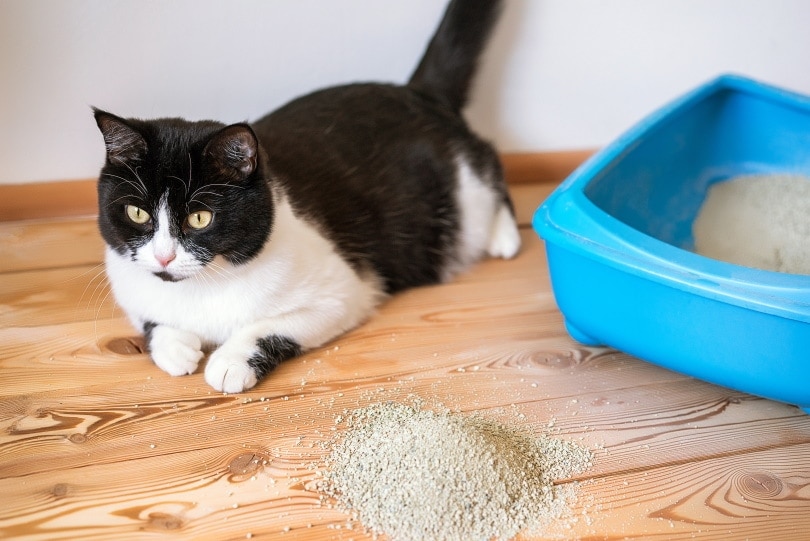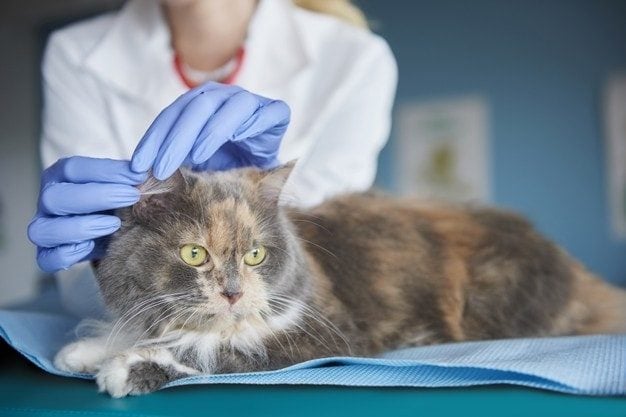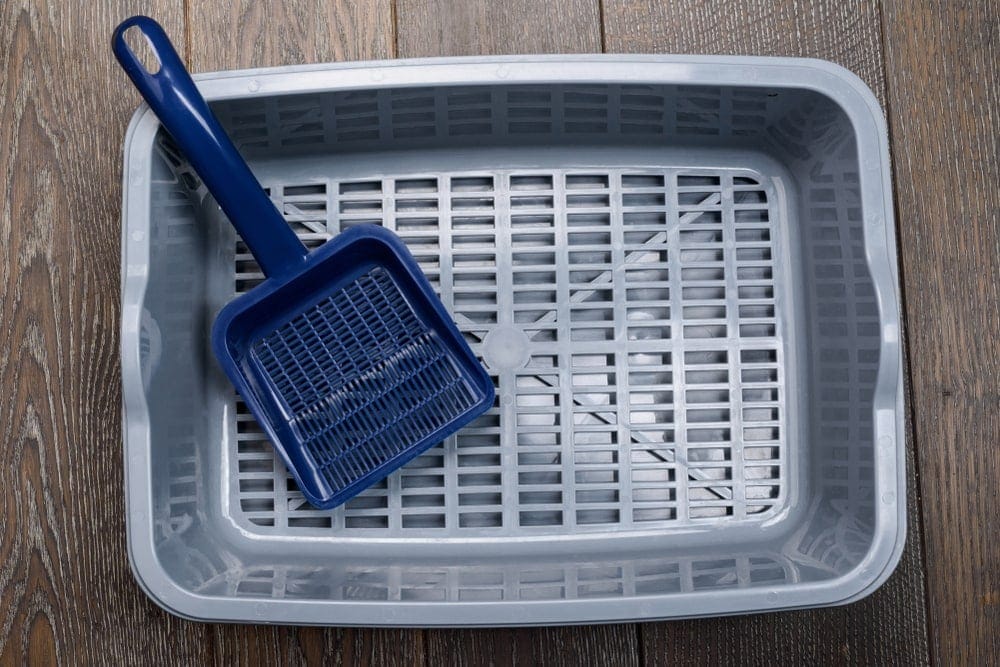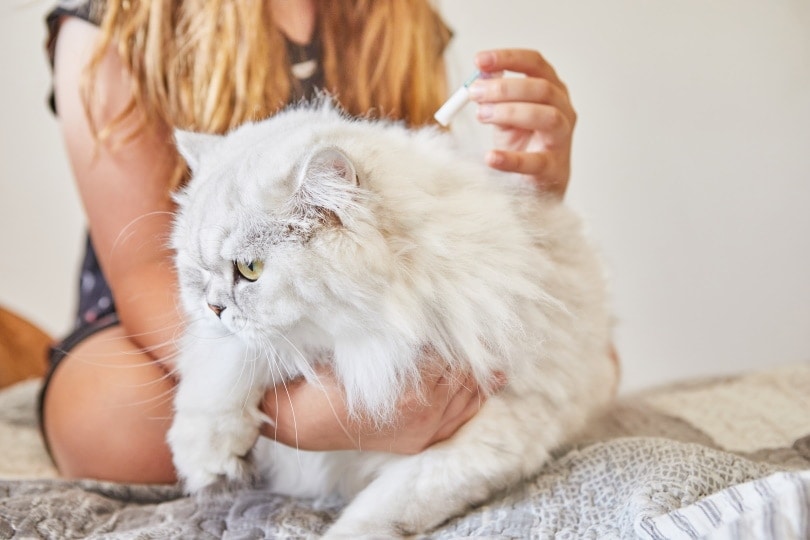How to Stop a Cat From Pooping on the Floor: 5 Reasons & Solutions
Updated on

Cats make excellent pets. They are independent and require little care compared to dogs. They are warm and cuddly, and they will not eat you out of house and home. They are usually good at using the litter box too. However, some cats stop following the potty rules and start pooping on the floor instead.
The trick to stopping a cat from pooping on the floor is figuring out exactly why the cat is displaying this behavior. Then, you can address the cause itself and have a better chance of getting your cat to start using the litter box again. Stopping your cat from pooping on the floor may take time and patience, but the process should be worth it in the end. Let us look at the most common reasons that your cat might be pooping on the floor and how to stop the behavior.
The 5 Reasons (& Solutions) Your Cat May Be Pooping on the Floor
1. Health Problems Are Present
Sometimes, a cat will stop using their litter box and start pooping on the floor due to a health problem. It could be a kidney infection, a bad digestive reaction to a new brand of food, or something more serious. Therefore, it’s important to take your cat to see a veterinarian soon after discovering that they are pooping on the floor.
If a health problem is why your cat is pooping on the floor, you have to address the problem to stop the behavior. If your cat has a clean bill of health, you can start looking at other possible reasons and solutions for the problem of pooping on the floor.

2. The Litter Box Is Too Crowded
If you have more than one cat, the litter box might be too crowded for them, which can lead to bathroom accidents on the floor. Cats want to always have their own space to rely on. If their litter box is filled with the smells and waste of other cats, they may not feel comfortable or safe enough to use the box themselves.
An easy fix for this problem is to add another litter box to your household. No more than two cats should be expected to use the same litter box, and even that might be too many in the opinion of some cats. You may have to provide your problem kitty with a litter box all their own to keep them from pooping on your floor.
3. The Litter Box Is Too Dirty
One common reason for cats avoiding their litter box is that the box is simply too dirty for their preference. Even if you think that you are doing a good job of cleaning out the litter box regularly, your cat might disagree with you enough to use the floor.
It could be that the cat box is fine in the morning after you filter the litter, but by the end of the day, the box is too dirty for your kitty’s paws, and the floor ends up being the more appealing option. Maybe it is just been too long since you have completely changed the litter out. Whatever the reason, upping your cleaning efforts should encourage your cat to stop pooping on the floor and to start using the litter box again.
Instead of filtering the litter once a day, try doing so twice — once mid-morning and once in the later afternoon. If you usually clean out the litter and replace it a couple of times a month, try doing so once a week. Make sure to wash the litter box whenever you completely change the litter. These extra efforts should go a long way when it comes to correcting your kitty’s bathroom behaviors.
Sometimes even the best litter box setup needs a helping hand in combating invasive smells. Our Hepper Advanced Bio-Enzyme Cat Litter Deodorizer naturally breaks down odors at the source. This effective litter additive can help all types of cat litter last longer, saving you money, and is safe for all life stages. Best of all, it's 100% biodegradable and fragrance-free.
- Bio Enzymatic Cat Litter Freshener - Smart formulation uses natural ingredients eliminating cat...
- Save Money - Stuff for cats isn’t the cheapest. With this litter box odor eliminator, you’ll...
4. The Litter Box Is in the Wrong Place
Another reason your cat might be pooping on the floor is that they think that their litter box is in the wrong place. Some cats like a great deal of privacy when they use the bathroom, so a litter box in the family room where everyone in the household tends to hang out is not a good idea. If your cat’s litter box is in a place that experiences foot traffic during the day, consider moving the box to a more isolated place, like a closet, bathroom, or garage.
You should also consider that the litter box might be getting harder for your aging cat to access nowadays. If your cat seems to be slower and less agile than they used to be, try putting their litter box in a more accessible place, like under a table instead of behind furniture or plants.
5. Changes Have Been Made in the Household
When cats get stressed out, they can start behaving oddly and do things like poop on the floor instead of in their litter box. Any changes introduced to your household could stress out your cat and affect their bathroom habits as time goes on. Getting a new cat, having a baby, and even moving the furniture around can stress your cat out enough for them to have accidents on the floor.
Even short-term sources of stress, such as house parties and sick family members, can be stressful for cats and change their bathroom habits. Being mindful of any changes made in the household and how to minimize the effects of those changes for your cat can help ensure that they do not stress out and end up pooping on your floor.
If a new cat is introduced to the household, give your current cat a room to live in for a while until they get used to the situation. The same goes for the introduction of a new baby to the household. Whenever you have a party or get-together, put your cat in a kennel or a safe, quiet room. If you plan to move your furniture around, do so just a couple of pieces at a time. Once your cat gets used to a small change, you can implement another change until all your furniture has been moved as you see fit.
Conclusion
Cats are fun to spend time with, but they can be finicky when it comes to their living conditions. If your cat is pooping on the floor, start with a visit to the veterinarian. If all checks out there, start working toward determining exactly why the behavior is happening, and only then can you start taking steps toward stopping it. Hopefully, this guide has provided you with all the information that you need to get your cat to start using the litter box again.
- Related Read: Best No-Scratch Sprays for Cats
Featured Image Credit By: Tanya Plotnikova, Shutterstock












